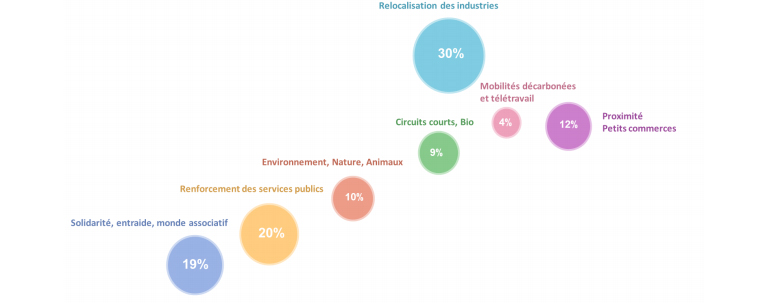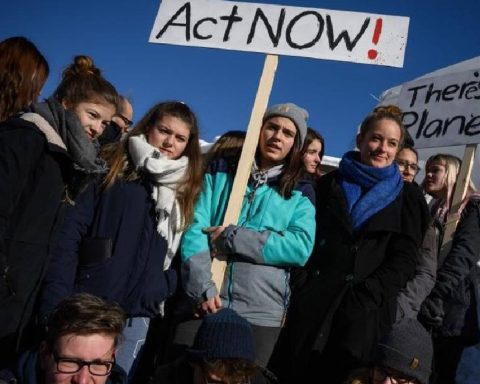The ordeal of Covid-19, marked by the confinement of half the world's population and the halt of the economy, was not only unprecedented in history. It was brutal and had a strong impact on all our lifestyles, including our most basic freedoms. What will be left of this period? Will it have influenced our world view, our aspirations and our ideals? Did it create new dividing lines in our societies but also, perhaps, new utopias? To answer these questions, a major survey conducted by the Obsoco has just released its first results and paints a triptych of the French.
The heart of this investigation, led by Obsoco with Ademe, was to make the French react to three models of ideal society, three "utopian systems": ecological utopia, security utopia and techno-liberal utopia.
Ecological Utopia evokes an organization of the economy and society tending towards balance and sobriety. Responding first and foremost to the ecological imperative, it is accompanied by lifestyles and consumption patterns that could be summed up by the formula "less but better".
The security utopia is a society nostalgic for a bygone past, anxious to preserve its identity and singularity in the face of foreign influences, whether they come from economic and institutional globalization or the arrival of new populations. Here, clearly, the difficulty of projecting oneself into the future favours the search for ideals in a reinvented past, a supposed golden age which then takes on the features of a utopia.
Techno-liberal utopia, finally, which, following a hypermodern path, describes a society in which individualistic values and the recognition of individual rights prevail, benefiting from strong growth (but generating inequalities) thanks to the vigour of technical progress that goes as far as increasing the human factor, in a transhumanist perspective.
Three France for three utopias
This study is a second wave following a survey conducted in 2019. From one year to the next, French preferences for the three utopian systems seem at first glance remarkably stable: 55% favour ecological utopia, 31% safe utopia and 14% techno-liberal utopia (for 55%, 30% and 15% respectively in 2019).
However, behind this apparent stability, an in-depth analysis of the results reveals significant and instructive changes in the way the French live, interpret and appropriate the unprecedented episode of the COVID-19 health crisis.
Beyond the averages, if ecological utopia continues to be the utopian system best evaluated by the French, it benefits from a five-point increase among those who evaluate it "very favourably", to 25%. At the same time, secure utopia gains 3 points among supporters, with 18% very favourable opinions.

Significant developments are also emerging in terms of structure. A comparison of the profiles of the proponents of each of the three utopian systems in the two waves of the survey reveals that, on many issues, the relative stability of the averages conceals divergent trends according to the different components of the population. On several themes, the gap is widening between the top of the social ladder and the bottom or intermediate level.
For example, the attraction for ecological utopia is increasing strongly among the higher socio-professional categories (CSP+), from 57 % to 68 %, while that of the intermediate CSPs has decreased from 61 % to 52 %, mainly in favour of security utopia.
Similarly, the attraction exerted by ecological utopia on the youngest, already strong, has been further strengthened: now, 72 % of 18-24 year olds have expressed their preference for this utopian system (61 % in 2019), to the detriment of security utopia (16 %, against 22 % in 2019). This movement is partially offset by a certain decline in ecological utopia among the 65-70 year-olds, who are now only 40 % to designate it as their preferred utopian system (51 % in 2019), to the benefit of the other two utopias.

While the aspiration to consume less but better is increasing in CSP+, it decreases sharply in CSP-. Similarly, the progression of the aspiration to work less is concentrated on respondents at the top of the social scale, while the opposite movement is observed among CSP- and intermediate CSPs.
A Critique of Globalization
The experience of the health crisis has reinforced the critical stance towards globalisation, which was very much present before containment. Cosmopolitan orientations, already in the minority, are on the wane and the relationship with "abroad" is marked by significant reservations (including on the part of supporters of ecological utopia), with the aspiration to see a reduction in the flow of immigrants progressing between the two waves.
In 2019, 36 % of respondents agreed with the proposition "I support the establishment of a world government with global citizenship". This share now stands at 27 %, while the share of respondents disagreeing increased from 42 % to 50 %. This movement is found across all age groups. It is particularly noticeable among 18-24 year olds, where the rate of agreement with the idea of global citizenship has risen from 52 % to 40 %. This rate continues to decline monotonously with age (10 % among the 65-70 age group). The decline is also particularly marked among CSP-.
The vision of an economy protected from international competition, which is relocating, is widely shared and is making progress. The deepening of this logic of closure (which moreover directly echoes the way in which the health crisis has been managed in France and elsewhere by the closure of borders) is also reflected in the appetite for the local and proximity, which is also already present but which is coming out stronger.
An ambiguous relationship to science and technology
The crisis seems to have had an ambiguous effect on the French relationship with science and technology, and thus with experts. The already strong rejection of the encounter between technology and life, of transhumanist perspectives on the "increased man", has become even more pronounced and constitutes an element of consensus within French society. At the same time, however, the idea of the importance of supporting the development of science and technology, particularly in order to ensure greater independence of the country from abroad, brought together a large and growing proportion of the respondents. This is probably the result of both the awareness of the importance of research in the face of the major risk posed by a pandemic and the country's dependence on foreign countries in this area.
The proportion of French people expressing confidence in the ability of science and technology to deal with environmental problems rose by 6 points and thus became the majority. The media exposure that researchers received during the crisis and the role that the scientific council played in the decisions taken by the Government most likely contribute to the rise in aspirations to see competence and expertise play a more important role in the organisation of political life.
Conversely, there has been a marked decline in visions of an ideal political system based on non-professional elected politicians or citizens drawn by lot. Nevertheless, the aspiration to see citizens more involved in decision-making, through the use of referendums, remains very strong.
Taking a step back from work
The confined situation in which a large proportion of the working population found itself may have been a time to reflect on their professional situation and the place of work in their lives.
Gaps in the ideal working week have widened, as the share of those in work who want to work more but also those who aspire to work less than 35 hours increases. The latter are now more numerous (one in two) declaring that they are prepared to accept a drop in income in return.
Time spent with loved ones and the practice of do-it-yourself remain strong aspirations in the use of time released before holidays and the exercise of one's passions. This appetite for intensifying relations with loved ones is confirmed by the priority that is given to the proximity of family and friends in defining the ideal living environment, which marks a step forward compared to the pre-crisis situation.
A life in harmony with nature
The level of concern about environmental issues, which was initially very high, has not increased significantly as a result of the health crisis. There has even been a significant decline, among those declaring that they want to consume better, in the modality of purchasing environmentally friendly products, in favour of more directly self-centred benefits (useful products, products that last), and the consumption of local products.
However, the relationship to nature has scored points during this period of containment.

Investigators asked a question about "designing a successful life". Respondents' choices among the items proposed to them remain rather scattered. "Personal development, self-actualization" still ranks first, but loses 3 points on the sum of the first and second choices. "Financial comfort, material comfort" remains in second place, but also loses 2 points.
While the preference for financial affluence seems to be independent of age, the preference for fulfilment is particularly marked among the under-35s (around 45 %, and only 22 % among the 65-70s). The combination of these socio-demographic factors undoubtedly explains why personal fulfilment is more highly valued (at nearly 45 %) by the inhabitants of the city centres of the 12 largest metropolises. On the political level, personal fulfilment is valued by nearly one in two respondents who say they are close to environmental movements, compared with, for example, 31 % for those who rank "very right". The opposite is observed with regard to material well-being.
"Societal success" is also down 2 points. Materialistic approaches to life therefore seem to have slightly slowed down during the health crisis.
The strongest increase is for "a life in harmony with nature", which gained 5 points to 20 % when the two choices are combined. This increase is concentrated in the intermediate age groups, while the share of 18-25 year-olds who selected this item fell from 9 % to 7 %. The increase is also very marked among the inhabitants of rural and very low-density municipalities. There was also a slight increase in "commitment to a cause" and "the multiplication of encounters and the enrichment of relationships with others".
What is indispensable and what isn't?
To complete their approach, the interviewers also introduced two open-ended questions in their questionnaire, directly - but freely - inspired by the lines of thought launched by Bruno Latour in an article published last March 30 in the online magazine AOC, inviting readers to draw up a small inventory of the activities they would like to see restarted, developed or, on the contrary, slowed down or stopped.
At the top of the list of activities that they do not consider indispensable for the country and society: polluting industries and mobility - especially air transport - then relocations. A significant proportion of respondents also question our development model with the call to sharply reduce or even stop mass/intensive production and mass consumption.

With regard to the activities they would like to see resumed, developed or invented in an "after-world", the most frequent suggestions refer to the relocation of economic activities, the strengthening of public services and solidarity and mutual aid. On this last point, on reading the contributions, it is above all the solidarity towards the closest (neighbours), the most diminished, the elderly or hospital staff that is expressed. There is also an economic aspect to this dimension, with support for small shops, short circuits and organic products.

In conclusion, the episode we are going through seems to have consolidated a consensual base around the desire to move towards a society associated with an organisation of economic life and lifestyles and consumption patterns that are more compatible with environmental challenges, based on greater control of relations with foreign countries and the enhancement of local and proximity.
One of the strong results of the 2019 wave of the survey remains valid: beyond the awareness of the need to react to the climate emergency, it is indeed a desire for an in-depth overhaul of the foundations of the economic and political organisation of society that is expected and, no doubt even more so, a desire to move towards lifestyles that, through the intensification of social relations, territorial anchoring, personal fulfilment and the conquest of greater autonomy, particularly through "doing", contribute to a new definition of well-being. Nevertheless, the fact remains that fault lines persist and even widen in the aspirations of the French (particularly in the relationship to otherness or consumption) and that, beyond ideals, the various components of society are exposed to different systems of constraints. Overcoming these divergent aspirations represents real challenges both in terms of maintaining the status quo and initiating transformational trajectories consistent with these aspirations.
Methodology. The Observatory of Utopian Perspectives is based on an online survey carried out on the Respondi panel between 6 and 13 May 2020 with a sample of 1888 people representing the population of metropolitan France aged 18 to 70. This study is a partial renewal of the Observatoire des perspectives utopiques published in 2019 with the support of ADEME, BPI-France and the ESCP-E.Leclerc - BearingPoint Chair. In order to facilitate comparisons, the questions, their presentation in the questionnaire and the sampling have been reproduced identically. Thus, in order to guarantee a fine representativeness, the data were adjusted on the basis of all the criteria used as quotas.












